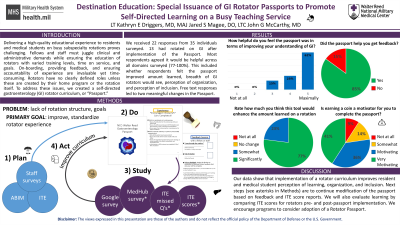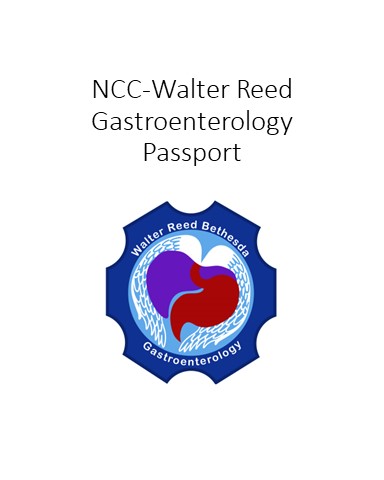Tuesday Poster Session
Category: Practice Management
P4923 - Destination Education: Special Issuance of GI Rotator Passports to Promote Self-Directed Learning on a Busy Teaching Service
Tuesday, October 29, 2024
10:30 AM - 4:00 PM ET
Location: Exhibit Hall E

Has Audio
- KD
Kathryn Driggers, MD
Walter Reed National Military Medical Center
Bethesda, MD
Presenting Author(s)
Kathryn Driggers, MD, Jared Magee, DO, MPH, John G.. McCarthy, MD
Walter Reed National Military Medical Center, Bethesda, MD
Introduction: Delivering a high-quality educational experience to residents and medical students on busy subspecialty rotations proves challenging. Fellows and staff must juggle clinical and administrative demands while ensuring the education of rotators with varied training levels, time on service, and goals. On-boarding, providing feedback, and ensuring accountability of experience are invaluable yet time-consuming. Rotators have no clearly defined roles unless these are created by their home program or the rotation itself. To address these issues, we created a self-directed gastroenterology (GI) rotator curriculum, or “Passport.”
Methods: A GI rotator curriculum, physically modeled to mimic a passport, was created with the primary goal of improving and standardizing rotator experiences. Secondary goals include: 1) expose rotators to broad experiences within GI, 2) improve rotation feedback quality, 3) augment resident interest in GI and 4) ensure rotators feel welcome during their rotation. Topics were identified using the American Board of Internal Medicine Blueprints, our internal medicine residency’s in training exam (ITE) most missed topics, and surveys of GI staff and fellows. We created a 15-page, 3x5 inch bound passport with areas for feedback, self-reflection, and GI experiences, clinical encounters, and procedures. During the rotation, the trainee collects faculty signatures or “stamps” to reflect task completion.<span style="mso-spacerun: yes;"> After 4 months, we anonymously surveyed medical students and internal medicine residents who had rotated on GI. In addition, internal medicine residents planning to rotate through our department were prospectively surveyed.
Results: We received 22 responses from 35 individuals surveyed. 13 had rotated on GI after implementation of the Passport. Most respondents agreed it would be helpful across all domains surveyed (77-100%). This included whether respondents felt the passport improved amount learned, breadth of GI rotators would see, perception of organization, and perception of inclusion. Free text responses led to two meaningful changes in the Passport.
Discussion: Our data show that implementation of a rotator curriculum improves resident and medical student perception of learning, organization, and inclusion. Next steps are to continue modification of the passport based on feedback and ITE score reports. We will also evaluate learning by comparing ITE scores for rotators pre- and post-passport implementation. We encourage programs to consider adoption of a Rotator Passport.

Disclosures:
Kathryn Driggers, MD, Jared Magee, DO, MPH, John G.. McCarthy, MD. P4923 - Destination Education: Special Issuance of GI Rotator Passports to Promote Self-Directed Learning on a Busy Teaching Service, ACG 2024 Annual Scientific Meeting Abstracts. Philadelphia, PA: American College of Gastroenterology.
Walter Reed National Military Medical Center, Bethesda, MD
Introduction: Delivering a high-quality educational experience to residents and medical students on busy subspecialty rotations proves challenging. Fellows and staff must juggle clinical and administrative demands while ensuring the education of rotators with varied training levels, time on service, and goals. On-boarding, providing feedback, and ensuring accountability of experience are invaluable yet time-consuming. Rotators have no clearly defined roles unless these are created by their home program or the rotation itself. To address these issues, we created a self-directed gastroenterology (GI) rotator curriculum, or “Passport.”
Methods: A GI rotator curriculum, physically modeled to mimic a passport, was created with the primary goal of improving and standardizing rotator experiences. Secondary goals include: 1) expose rotators to broad experiences within GI, 2) improve rotation feedback quality, 3) augment resident interest in GI and 4) ensure rotators feel welcome during their rotation. Topics were identified using the American Board of Internal Medicine Blueprints, our internal medicine residency’s in training exam (ITE) most missed topics, and surveys of GI staff and fellows. We created a 15-page, 3x5 inch bound passport with areas for feedback, self-reflection, and GI experiences, clinical encounters, and procedures. During the rotation, the trainee collects faculty signatures or “stamps” to reflect task completion.<span style="mso-spacerun: yes;"> After 4 months, we anonymously surveyed medical students and internal medicine residents who had rotated on GI. In addition, internal medicine residents planning to rotate through our department were prospectively surveyed.
Results: We received 22 responses from 35 individuals surveyed. 13 had rotated on GI after implementation of the Passport. Most respondents agreed it would be helpful across all domains surveyed (77-100%). This included whether respondents felt the passport improved amount learned, breadth of GI rotators would see, perception of organization, and perception of inclusion. Free text responses led to two meaningful changes in the Passport.
Discussion: Our data show that implementation of a rotator curriculum improves resident and medical student perception of learning, organization, and inclusion. Next steps are to continue modification of the passport based on feedback and ITE score reports. We will also evaluate learning by comparing ITE scores for rotators pre- and post-passport implementation. We encourage programs to consider adoption of a Rotator Passport.

Figure: GI Rotator Passport
Disclosures:
Kathryn Driggers indicated no relevant financial relationships.
Jared Magee indicated no relevant financial relationships.
John McCarthy indicated no relevant financial relationships.
Kathryn Driggers, MD, Jared Magee, DO, MPH, John G.. McCarthy, MD. P4923 - Destination Education: Special Issuance of GI Rotator Passports to Promote Self-Directed Learning on a Busy Teaching Service, ACG 2024 Annual Scientific Meeting Abstracts. Philadelphia, PA: American College of Gastroenterology.

